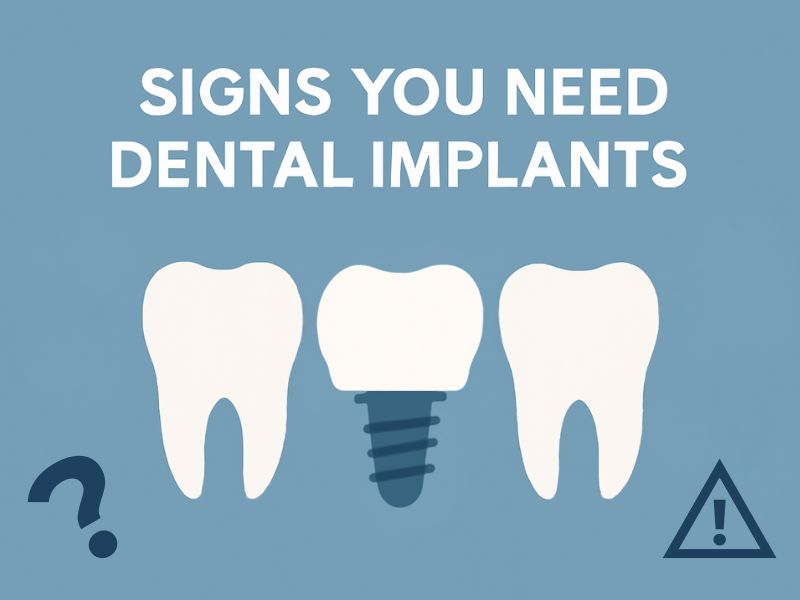
There are many ways to replace missing teeth with artificial ones. One of them is dental implants, a solution that you can use for a long time or even a lifetime due to its durability and permanence. Of course, dental implants are not only used to replace missing teeth. So when are dental implants the best option? Let's look at 13 signs that you need dental implants.
13 Signs You Need Dental Implants
1. Missing teeth:
If you have one or more missing teeth, dental implants are a good solution to replace them. Implants look natural by filling the gap of missing teeth and are a great option to solve the problem of missing teeth.
2. Damaged or infected teeth:
- If a tooth is infected, there is no other way to save it, and it has to be extracted; the implant will act as a new tooth.
- A severely broken or cracked tooth may also indicate the need for an implant. If the fracture is below the gum line or the pulp (nerve) is damaged, the tooth may have to be extracted. In this case, an implant may also be an option.
- In cases where conventional treatments (such as fillings or root canal treatment) are not effective, persistent toothache may also indicate underlying problems, and an implant may be recommended.
3. Loose or shifting teeth:
Loose or shifting teeth can be a sign of advanced gum disease or bone loss. In this case, the tooth or teeth may need to be extracted. Implants to replace the extracted tooth or teeth are securely attached to the jawbone.
4. Loose or ill-fitting dentures:
Loose full or partial dentures sometimes don't function the way you want them to. Traditional dentures can shift during eating and drinking or cause various irritations that can make you uncomfortable. If the denture is supported by an implant, the slippage and irritation associated with conventional dentures will be avoided.
- No need for glue
- No need to remove your dentures for cleaning
- Your quality of life improves
5. Loose dental bridges:
Building dental bridges often requires abrasion on healthy teeth on both sides of the gap, which can jeopardize the life of these healthy teeth. Implants allow us to replace the missing tooth with an artificial tooth without interfering with neighboring healthy teeth.
If the dental bridge or denture is loose, the artificial teeth may not function properly. A dental bridge or denture supported by implants can solve this problem.
In addition, if an existing dental bridge starts to leak or if the connecting teeth start to decay, this is also a sign of the need for dental implants.
6. Jawbone loss and structural changes:
When teeth are missing, the jawbone begins to weaken and erode over time. This is because the jawbone needs stimulation from the tooth roots to maintain its density. Implants mimic this stimulation and prevent bone loss.
Significant changes in the jaw structure, such as a sunken appearance, can occur due to missing teeth. Preserving the jawbone and facial structure is also a reason for the need for dental implants.
7. Gum problems:
Gum recession can expose tooth roots and can be a sign of various dental problems. Gum disease (periodontal disease) is also a major cause of bone loss. When the supporting bone structure wears away, teeth can become loose and eventually be lost. Implants can provide stability and prevent further gum recession.
8. Wear on neighboring teeth:
When a tooth is missing, neighboring teeth will be subjected to additional pressure and strain during chewing, leading to premature wear and tear on the teeth. Implants will reduce excessive wear on neighboring teeth by evenly distributing chewing forces along the dental arch.
9. Difficulty chewing and speaking:
Missing or damaged teeth can affect the ability to chew food properly or speak clearly. Implants can restore the function of teeth and improve quality of life.
10. Chronic bad breath or infections:
Bad breath can be the cause of dental problems such as untreated cavities or gum disease. Implants can help improve oral hygiene, which can eliminate bad breath by eliminating the source of infection.
11. When conventional dental treatments do not produce the desired results:
In some cases, conventional dental treatments may not be appropriate or effective for extensive tooth loss or tooth damage. For people with multiple missing teeth or poor oral health, options such as dental bridges or dentures may not be viable long-term solutions. Dental implants offer a versatile and customizable treatment option that can meet a wide range of dental needs and preferences.
12. Lack of confidence about your smile:
Missing teeth or wearing dentures, removable partial dentures, or dental bridges can make you feel insecure about your smile. Implants can restore a confident smile by providing a solution that looks and feels natural.
13. Desire for a long-term solution:
Experiencing the same dental problems again and again negatively affects both social life and quality of life. In this case, we turn to permanent solutions, and we want the solution to be lifelong.
- Dental bridges last an average of 10-15 years. Afterwards, decay in the adjacent teeth or bridge replacement may be required.
- Removable dentures need to be renewed every 5-7 years as bone resorption continues.
- Removable partial dentures: metal hooks can damage teeth and create aesthetic concerns.
Reasons to find a permanent and long-lasting solution with dental implants:
- Integrates with the bone.
- Titanium implants fuse with the jawbone and function like a natural tooth root.
- Can be used for a lifetime (with good care).
- It does not damage neighboring teeth; unlike dental bridges, neighboring healthy teeth are not cut. Thus, the life of other teeth is prolonged.
- Prevents bone loss; implants stimulate the jawbone and stop its resorption. In this way, your facial structure is preserved.
With our guaranteed treatments, we are always here for you.
Don’t hesitate to contact us, We will be happy to help anytime.



